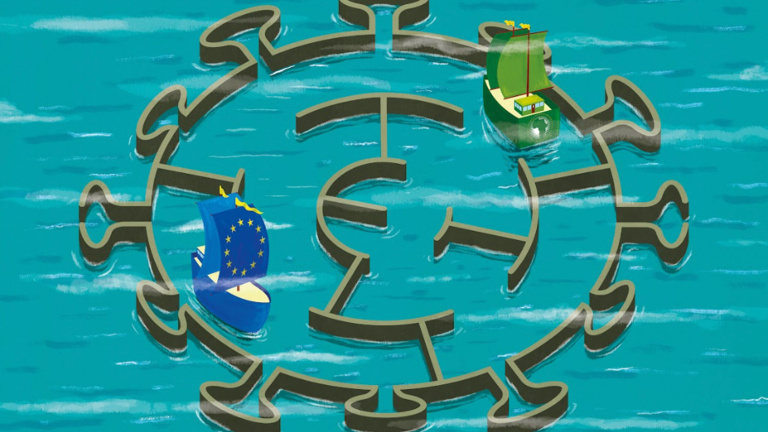
Africa needs a strategy for Europe
After decades of calls by leading voices from both continents, the relationship between Africa and the European Union (EU) is being reviewed. But for a complete rethinking of the partnership both parties need to clearly define their common interests and strategic priorities.
A widening field
With a growing population and significant economic potential, Africa has become more of a geopolitical focus. The growing competition for influence between the continent’s traditional partners and emerging powers, such as China, India, Russia and the Gulf States, has given many governments across Africa increasing agency. But the EU is still the most significant player in Africa, and redefining the strategic priorities for the partnership between the two continents has become ever more important.
In the EU, aspiration and incoherence
To date, the Africa-EU partnership has been shaped by a series of frameworks developed primarily by the EU. These include the Joint Africa-EU Strategy (JAES), which was adopted in Lisbon in 2007, and envisaged as a long-term, continent-to-continent partnership of equals. But the JAES does not work in harmony with other agreements, such as the 2000 Cotonou agreement, which governs EU-Africa trade and is currently being renegotiated; the regional strategies adopted by the EU Council for the Horn of Africa, the Gulf of Guinea and the Sahel; and the EU’s bilateral trade pact with Africa’s economic powerhouse – South Africa. The result has been incoherence.
Moreover, EU member states’ interests and priorities, particularly their concerns about security and migration, have brought additional complexity and tension. This has pushed the relationship further away from a ‘partnership of equals’. The EU’s piecemeal approach has also contributed to the fragmenting of the continent, dividing African voices and agency, and weakening and slowing of the pace of African integration.
A new EU strategy with Africa
The EU wants to engage differently with Africa. It wants to move away from a donor-recipient dynamic prioritising development, humanitarian and security concerns, towards a more balanced relationship based on trade and investment. An unprecedented series of high-level visits in 2020 has signalled Africa’s importance as an EU foreign policy priority. The new President of the EU Commission, Ursula von der Leyen, chose Addis Ababa as the destination of her first overseas visit outside the EU. Twenty-two of her Commissioners attended the 10th EU-African Union (AU) Commission-to-Commission meeting, while the European Council President, Charles Michel, attended the AU Annual Summit. In addition, several EU members states that have not traditionally prioritised Africa have now developed strategies for engagement with the continent.
In March 2020, the EU released a joint communication titled ‘Towards a Comprehensive Strategy with Africa’, offering a basis for the new Africa strategy expected to be agreed at the next AU–EU summit, now postponed to 2021 due to the COVID-19 crisis. The communication proposes strengthened cooperation between the EU and Africa through collaboration in five areas: green transition and energy access; digital transformation; sustainable growth and jobs; peace and governance; and migration and mobility. It also emphasises African capacity in security and defence, infrastructure development, and regional and continental economic integration.
Though there is no doubt that the proposal underlines the EU’s commitment to Africa, responses to it have been mixed. For example, it is unclear how the strategy will fit with the post-Cotonou negotiations or with the new financing mechanism that will replace the European Development Fund (EDF). It has also been criticised as being vague on how to address the migration issue, which has become central to the political debate in several EU members states, and on issues such as the securitisation of development policies and illicit financial flows.
In the AU, ambition without strategy?
The AU, too, wants to institutionalise a partnership with the EU that includes political and trade relations, oriented towards the goals of ‘Agenda 2063’, the AU’s vision for an integrated Africa. This ambition is most visibly embodied in the signing of the agreement establishing the African Continental Free Trade Area (AfCFTA) in 2018. Creation of the AfCFTA, which is the largest free trade area established since the founding of the World Trade Organization, sends a very important economic and political signal and has given the AU leverage in its political relationships with the continent’s international partners.
(The EU has faced some criticism that its new strategy is insufficiently aligned with these African aspirations. But the EU’s Africa strategies inevitably reflect its own internal priorities.)
The AU and its member states need to move beyond following the EU’s lead to define their own priorities, including development of a long-term comprehensive strategy for Europe. To date, the AU has not articulated a vision that reflects the continent’s expectations for its partnership with the EU. As illustrated with Agenda 2063, the AU does have ambitious goals for the continent, but it is often unclear how these relate to its international relations.
The AU’s heavy dependence on EU funding has been a complicating factor here, as it has created an unbalanced, donor-recipient dynamic that has led to tension and deep frustration. But the AU is undergoing a process of institutional reform that includes a roadmap for financial self-sufficiency. If successful, this will lead to less reliance on external funding, in particular from the EU.
Getting the fundamentals right
There is clearly political will on both sides and increased interest in strengthening cooperation and moving the partnership forward. But a mutually beneficial relationship cannot be achieved through good will alone. It requires getting the fundamentals right and for both parties to take an active role in shaping the partnership’s strategic priorities.
About the author
Tighisti Amare is Assistant Director of the Africa Programme at Chatham House.
Read the full magazine issue






